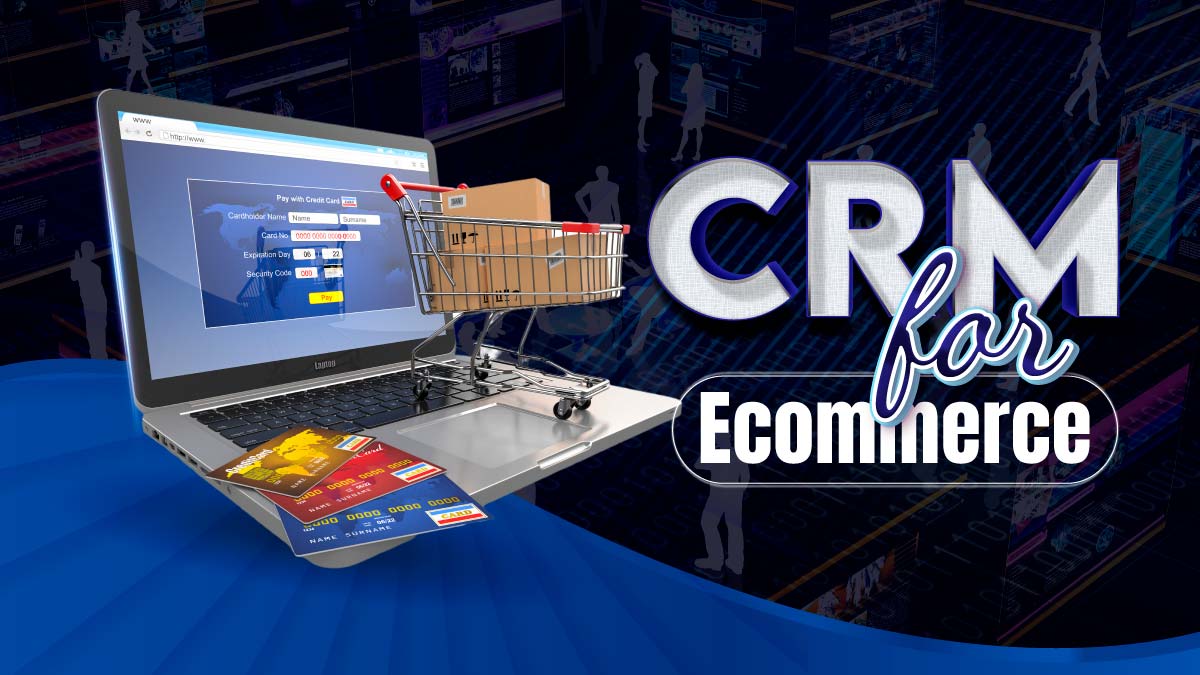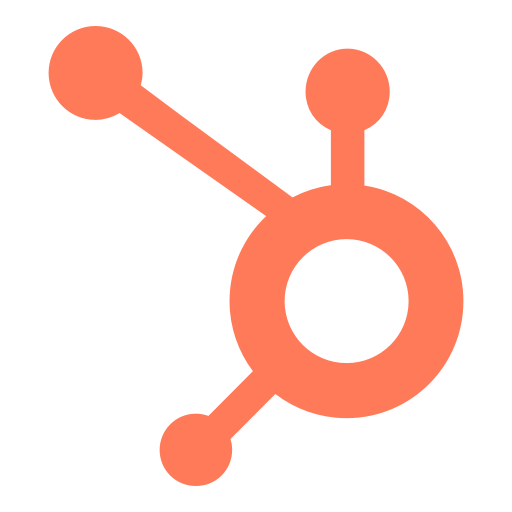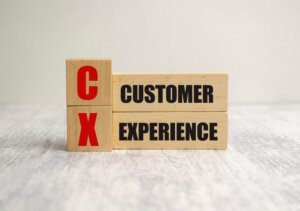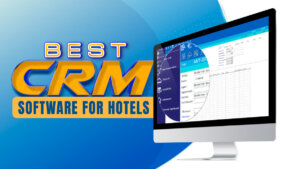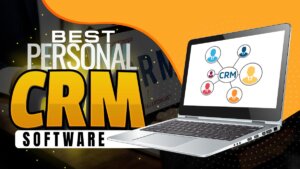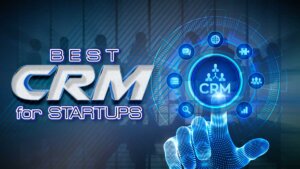We understand that customers are the lifeblood of any ecommerce company. Fortunately, customer relationship management can significantly increase online sales (CRM).
Using unique marketing techniques, use the Best CRM for Ecommerce software to help you generate new and repeat customers.
Quick View
- Best Overall – Salesforce
- Best for Marketing Workflows – Act!
- Best Free CRM Software – Zoho
- Best for Integrations – Pipedrive
- Best for Large Businesses – HubSpot
- Best AI-Driven Software – Microsoft Dynamics
Software
Price
Contact Managing
Workflow Automation
Interaction Tracking
Reporting and Analytics
$25 to $300 per user per month
Complete customer information, social media insights
Automatic approvals, drag and drop simplicity
Can schedule tasks or events, view conversations with each client
Tableau analytics platform for finding insights
$12 to $50 per user per month
Leads through marketing workflows, syncs with calendars and email
Email marketing programs, interactive templates
Keep tabs on current clients, monitor lead pipeline
Asset and website tracking, reporting tools
Free to $52 per user per month,
CRM Plus $57 per user per month
Engage across multiple channels
Automate processes with simple drag and drop tools
Monitor within the platform and social media integration
See how your ecommerce site performs at every stage
$12.50 to $99 per user per month
Use email marketing campaigns to drive prospects to clients
Customizable email templates, triggers to automate processes
View pipeline progress and communications
Campaigns pull in reports and insights
Free to $3,200 per month
Customized communications that drive sales
Visual automation builder
System logs interactions between employees and clients
Traffic analytics, custom reporting
Marketing from $1,500 per month
Connect sellers with potential consumers through their preferred communication channels
Can automate inefficient tasks
Engage customers in real-time
AI-driven recommendations from insights and analytics
Quick Verdict
Best Overall – Salesforce. Salesforce combines the best of CRM software with tools to assist online businesses of all sizes. Even at the entry level, contact and lead management tools are available, and the package includes insights and analytics to keep customers coming back.
6 Best CRMs for Ecommerce or Online Businesses
Without further ado, here are our picks for the best CRM solutions for ecommerce or online businesses currently on the market.
Salesforce is a massive customer relationship management system with plans for businesses of all sizes. The entry-level plan, which costs $25 per user per month, includes contact management tools as well as access to the Salesforce mobile app.
If you want to use marketing automation to make your ecommerce website more efficient, you’ll need to spend at least $150 per month. Salesforce makes it simple to automate even the most complex sales process automation steps at this price point. Only the highest tier provides 24/7 customer support if problems arise.
Customer relationships are where ecommerce CRM software really shines. Salesforce has the marketing campaigns to keep repeat customers coming back where an ecommerce business thrives on them. The CRM solution even uses social media tools to share insights and fuel individual marketing strategies.
You can use Salesforce’s Tableau analytics platform to identify areas of opportunity in your online business as needed. Salesforce is the best CRM software available, providing all of the tools required to retain clients and increase online sales from a single centralized platform.
- Included mobile app.
- Tableau analytics platform.
- Social media marketing.
- Scales well from small businesses to large.
- Limited support on all but the highest tier of service.
Act!’s ecommerce CRM system focuses on digital marketing features to engage potential customers and move them through the sales funnel. Even small businesses can benefit from offerings as low as $12 per user per month.
To take advantage of automated sales and marketing processes, teams will need to upgrade to a higher tier. These sales automation tools allow your CRM software to send marketing emails on your behalf while you focus on more important tasks. There are also hundreds of email marketing templates and sales pipeline management insights available.
Furthermore, Act! is comprehensive in terms of customer data tracking, allowing you to see the best ways to keep users plugged into your online store. Every CRM system in Act! is intended to integrate with other apps so that you always have all of the sales tools you require. Act! is also made possible by these tools. The best real estate CRM.
Act!’s CRM for ecommerce system provides powerful sales and marketing tools at a low enough cost that even small ecommerce businesses can use it.
- Mobile app.
- Several integration options.
- Strong customer support.
- Prices that scale with business needs.
- Additional cost for advanced marketing automation tools.
Zoho offers CRM software solutions for both small and large ecommerce platforms. At the high end, Zoho CRM plus has the most features, and a free version is available for new ecommerce businesses.
Customer segmentation is used in ecommerce CRM software so that you can categorize and stay on top of customer behavior at all times. In addition to basic communication tools, Zoho CRM can connect with potential customers via social media.
Zoho has inventory management, which is free at the basic level, so you can keep an eye on what’s in storage without having to be there. This is one of several add-ons that can raise the price if you require something in addition to the base package.
Within Zoho’s CRM features, you can see which tools are providing the greatest return on investment and which are simply costing you money. The CRM system even tells you which keyword led the customer to your ecommerce store.
For startups or small e-commerce businesses that can’t afford software right now, Zoho is the best free CRM software option on the market. For companies willing to take the risk, comprehensive ecommerce CRM software packages.
- Mobile app.
- Free inventory management for one warehouse.
- Several plan options.
- Free trial available.
- Add-ons can drive up the cost.
Pipedrive takes pride in being ridiculously simple to use, with its easily navigable dashboards and sharp email marketing tools. Pipedrive integrates with over 275 other tools to enhance these CRM systems.
There are a slew of customizable email templates and automation tools built into the ecommerce CRM software to help you streamline your marketing platform. The CRM solution saves communications and pipeline progress for each client as you work with them.
Despite the CRM solution’s low cost, ecommerce businesses will likely find the available tools lacking. While the next tier costs twice as much, it includes several CRM tools such as automated workflows to help ecommerce businesses run more efficiently.
Pipedrive collects and reports data from your ecommerce business’s email marketing campaigns for quick review. These analytics also provide insights into areas where your online store may need to improve for greater success.
Pipedrive’s CRM tool expands on an intuitive user dashboard by integrating with other apps that your ecommerce business relies on for success.
- Simple user interface.
- Hundreds of integrations.
- Strong sales management options.
- Several customizable areas.
- The cheapest plan is quite short on ecommerce features.
Hubspot CRM may be pricey for small businesses, but it is one of the best CRMs for ecommerce options for larger businesses. There is a free plan available, but it includes HubSpot branding on all communications you send.
Large businesses with their own customer support departments can use HubSpot to handle interactions from a large client base efficiently. Teams can communicate with clients and each other from within HubSpot, so no information is lost to cyberspace.Large businesses with their own customer service departments can use HubSpot to efficiently handle interactions from a large client base. Teams can communicate with clients and with one another within HubSpot, ensuring that no information is lost in cyberspace.
Hubspot combines marketing automation and visual cues in a user-friendly format. To maximize customer return potential, ecommerce businesses can tailor these custom workflows to the needs of their online stores. The CRM service also includes built-in web forms to eliminate any uncertainty about what clients require.
The ecommerce CRM software uses traffic analytics to show where sales are coming from. You can create custom reports that only follow the information you want to see.
HubSpot’s CRM solutions are undeniably expensive, but the breadth of tools available to large businesses is unparalleled.
- Omni-channel automated marketing applications.
- Built-in collaboration tools between team members.
- Free option available.
- Visual automation builder.
- Sales and marketing platforms each have unique costs.
Microsoft enters the fray with Dynamics, its own ecommerce CRM software. Dynamics distinguishes itself by utilizing Microsoft’s artificial intelligence to provide business-specific insights.
The ecommerce CRM solution allows you to connect with customers on their preferred platform, whether it’s social media or another. Even better, you can chat with customers in real time right from the Dynamics CRM system.
A plethora of automation features enable users to eliminate time-consuming, repetitive tasks that a computer can handle more efficiently.
All of these impressive features come at a cost, and Dynamics offers two different plans for its sales and marketing software. Marketing software costs $1,500 per user per month, and capitalizing on sales costs an additional $65 per month. Many other features of the CRM solution only add to the cost.
Microsoft Dynamics adds artificial intelligence software to an already impressive CRM platform. This solution is not cheap, but the enhanced analytics can identify issues that would otherwise go unnoticed.
- Integrates well with other Microsoft apps.
- Uses artificial intelligence for analytics.
- In-app collaboration tools.
- Ability to engage customers in real-time.
- Pricey software.
- Limited to Windows machines.
How To Choose CRM Software for Ecommerce Software or Online Businesses
When perusing ecommerce CRM systems, consider these points before making a purchase:
- Your customer base.
- Pricing.
- Features.
- Integrations.
- Customer service.
Consider Your Customer Base
Customers are critical to ecommerce success, and knowing who your customers are is half the battle. Once you’ve identified your target client base, make sure the CRM software you choose allows you to reach out to and market to them.
Look at Pricing
While you often get what you pay for, some more expensive ecommerce CRM solutions simply provide more than a startup or small business requires. Determine your budget’s limits so you can have realistic expectations about what you can afford.
Check the Features
Consider the features you already have access to and those you can’t live without as you plan to add CRM software to your existing list of applications. Some CRM packages charge separately for marketing and sales. Others, at lower price points, do not include automation tools.
Integrations
If you already have software for sales, marketing, or project management, it’s always a good idea to find a CRM solution that integrates with it. Having to deal with ten different apps is inconvenient, but working on them all from one location can be beneficial.
Customer Service
Who will you contact if things don’t work as they should? Check the CRM software’s customer service plans to ensure someone will be available when you need them. Many plans do not provide any assistance for free or entry-level software.
Frequently Asked Questions (FAQs) for Best CRM for Ecommerce
Final Thoughts on Best CRM for Ecommerce
It can be difficult to keep track of what consumers are thinking in an ever-changing world. Customer relationship management tools can significantly improve client acquisition and retention.
For all of the tools it provides, we believe Salesforce is the best ecommerce CRM software. If Salesforce doesn’t speak to you, we’re confident that one of the other CRM software options on this list will.
 Sections of this topic
Sections of this topic
